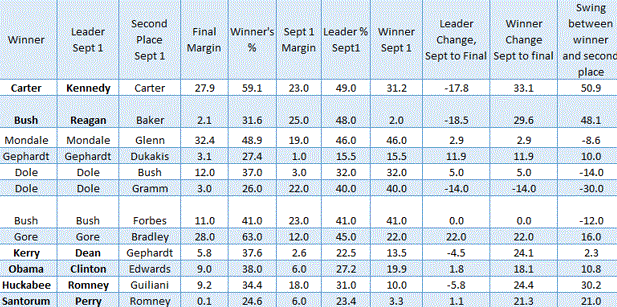Steven Shepard broke big news this week for political junkies: Gallup “isn’t planning any polls for the presidential primary horse race this cycle” and “won’t commit to tracking the general election next year.” Gallup editor-in-chief Frank Newport explained the decision “to put our time and money and brainpower into understanding the issues and priorities” of voters, rather than merely which candidate they prefer. Speaking to Harry Enten of FiveThirtyEight.com, Newport said “he wants to contribute to making the ‘government process work better’ and that he thinks issue polling can do that better than horse-race polling.”
Enten thinks it “sucks” that Gallup “gave up” on measuring the horse race, because despite problems with Gallup’s 2010 and 2012 election surveys, the firm uses “rigorous polling methodologies,” in contrast to some shady operators. Moreover, without horse-race polls to compare against election results, we won’t be able to judge the accuracy of Gallup’s issue-based polling, in Enten’s view.
Newport insists that Gallup’s decision is not about lack of faith in its polls’ accuracy.
Our decision is one of allocation of resources. In the 2012 cycle we invested a huge amount of time, money, and interviewing in tracking the horse race on a nightly basis.
Our question in this cycle: is this the best investment of resources to fulfill the mission of helping understand what is going on in a presidential election and hopefully helping make the nation better off as a result. Our thinking is that it is not; that tilting those resources more toward understanding where the public stands on the issues of the day, how they are reacting to the proposals put forth by the candidates, what it is they want the candidates to do, and what messages or images of the candidates are seeping into the public’s consciousness can make a more lasting contribution.
This may not be the focus that gets the most ‘clicks’ or short-term headlines, but is one which hopefully can make a real difference.
Amen to that. Steve Koczela reported for Commonwealth magazine that the Pew Research Center will also do less horse-race polling during the 2016 election cycle.
At least since the 1970s, media critics have bemoaned the excessive focus on the horse race in political reporting. A major theme of Robert Entman’s 1989 book Democracy Without Citizens was the harm done by covering politics like a game, rather than informing voters about substantive outcomes from government actions. A new poll coming out nearly every day tends to drive news reporting and analysis toward who’s up and who’s down. That happens to be easier than discussing policies, “which would require journalists having to actually read legislation and analyse its implications.” I celebrate Gallup’s choice to get off the tracking poll treadmill.
Continue Reading...
